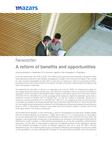
A reform of benefits and opportunities
It can be stated that Law 2155 of 2021 (Tax Reform) brought more fiscal benefits and opportunities than adverse provisions to the interests of taxpayers. Except for the five-point increase in the income tax rate and the impossibility to take 100% of the ICA as income tax discount (remaining at 50%), practically all the rest of the content of the reform consists of benefits, opportunities and options that favor the taxpayer's interests.
As substantial tax benefits: (i) the term is extended until June 30, 2022, for companies to apply for the orange economy exempt income (also, the minimum investment amount to access the benefit is repealed); (ii) the coverage of the simple taxation regime is extended, going from a maximum income of 80,000 UVT to 100,000 UVT; (iii) the coverage of the simple tax regime is extended, going from a maximum income of 80,000 UVT to 100,000 UVT; (iv) the tax regime is extended, going from a maximum income of 80,000 UVT to 100,000 UVT. 000 UVT; (iii) a large part of the country's territory is included as suitable to develop projects that may be financed with the works for taxes mechanism; (iv) the double taxation phenomenon derived from the temporary differences between accounting and taxes in PPPs is eliminated, through a carry back and carry forward system of profits; and (v) the three days without VAT policy is continued.
As procedural tax benefits: (i) the Law brings a new tax normalization tax that taxes omitted assets and non-existent liabilities as of January 1, 2022 with a rate of 17%; (ii) mechanisms for termination by mutual agreement and contentious-administrative conciliation are enshrined through which the taxpayer may compromise a large part of the penalties and interests of the discussions held with the different tax control entities, in administrative proceedings or during the contentious-administrative discussion; (iii) the Dian is empowered to apply the favorability principle, at the taxpayer's request, for the collection processes it carries out against taxpayers who, as of June 30, 2021, had tax obligations to pay, thus allowing them to pay current bank interest for the modality of consumer credits on tax penalties; (iv) a new audit benefit is created for the years 2022 and 2023, which will allow the finality of the tax returns in terms of six or 12 months, depending on whether the taxpayer increases by 35% or 25% its net income tax; (v) special payment conditions are created for debtors of fines for traffic violations.
As extra-fiscal benefits: (i) the Solidarity Income Program is extended until December 2022; (ii) the Paef is extended from May until December 2021; (iii) an incentive for the generation of new jobs is created consisting in that employers will receive a state contribution equivalent to 25% of one Minimum Legal Monthly Minimum Wage in Force (Smlmv) for each worker hired who is between 18 and 28 years old (for other new workers, who do not comply with the above and who earn up to three Smlmv, the employer will receive 10% of one Smlmv); (iv) a support is created for companies affected by the national strike to contribute to the payment of labor obligations for the months of May and June, corresponding to the number of employees multiplied by up to 20% of the value of the Smlmv; and (v) free education for low-income students ("zero tuition") is adopted as a State policy.


